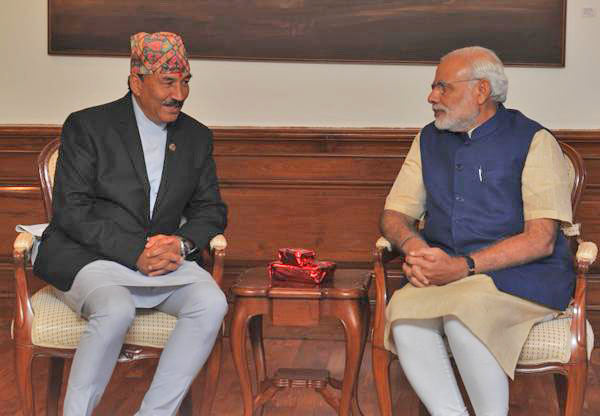'Twas de facto Indian blockade but Nepal resolved it diplomatically: DPM Thapa
KATHMANDU: Deputy Prime Minister and Foreign Minister Kamal Thapa said Nepal as a sovereign nation had to face “de facto blockade” from neighbouring India all of a sudden after the new constitution was constitution promulgated in September 2015.
He termed the term “de facto blockade” for the first time when Prime Minister KP Sharma Oli is all set to embark on a six-day state visit to India on Friday. DPM Thapa himself is accompanying the Prime Minister.
“After the promulgation of the new constitution, we had to face an unexpected but serious crisis in diplomatic sector,” Thapa said while speaking at a talk programme on Nepal’s post-constitution diplomatic development here in the Capital. “We had to face a de facto blockade, which was neither expected nor fair.” The function was organised by Tribhuvan University’s Master’s in International Relations and Development Programme.
Saying things have now been normalised, DPM Thapa said as the top diplomat of the country he kept restraint from using the term blockade in major international venues as it bears legal and multiple other meanings.
He stated that he was publicly criticised for not using the term ‘blockade’. “We succeeded in resolving this crisis diplomatically. Things could have worsened had Nepal taken any position levelling it as a blockade officially,” he explained.
READ ALSO
Visit aims at clearing differences between Nepal, India: PM Oli
Thapa recalled that he himself experienced India’s blockade against Nepal twice — during 1989-90 and 2015-16 —, and said the new generation, however, should not have to face difficulties as in the past.
According to him, the term "Indian establishment" is very broad and includes the Indian government, political parties, security and intelligence agencies as well as bureaucracy, and while dealing with them Nepal has to deal with all of them. “Sometimes they do cross-purpose activities and we get confused,” he said.
Thapa said Prime Minister KP Sharma Oli's upcoming visit would clear misunderstanding between the two countries. “Deeper friendship and shared prosperity is the main theme of this visit,” he said, “We are not going to India with a wishlist. Its main crux is strengthening relations based on mutual benefits and equality.”
He stressed the need of diversifying trade with other countries, particularly with China for Nepal's “survival”. He also underscored that any step
towards protecting Nepal's national interests -- by diversifying trade -- should not taken as a card played against one neighbour to another.
Though Nepal is a landlocked country by India and China, Thapa said, "General perception is that we are basically India-locked." He pointed out the need for correcting such a view.
“Earlier, Himalayas were as taken as a barrier,” he said. Now, highways, railways, tunnels are there across the Himalayas. It’s no more a barrier.”
Addressing the programme, former Minister Nilamber Acharya — who is also a member of Eminent Persons Group formed for reviewing Nepal-India
existing treaties — said India has not welcomed Nepal’s constitution yet though it acknowledged the amendment of the Constitution as a positive development.
He, however pointed out that the Nepali side failed to highlight the achievements and salient features of the new constitution.






